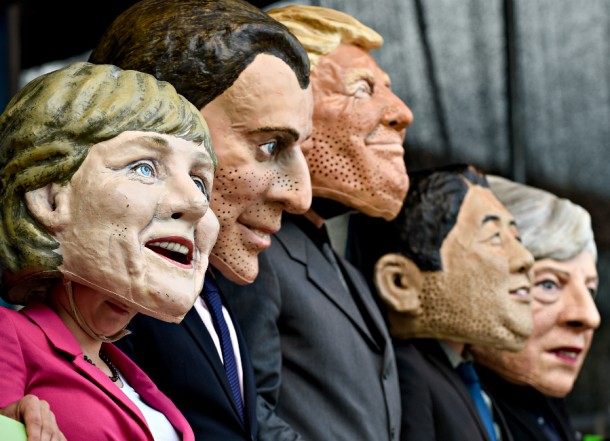-OpEd-
GENEVA — When it comes to choosing a future leader, a candidate's personality tends to be as important as his or her proposed policies. In the case of Donald J. Trump, the political ideas he expressed in his presidential campaign were simplistic, outrageous and Manichaean. His conduct was deliberately extravagant and he made no effort to conceal his private failings. In fact, throughout the campaign he displayed an essentially narcissistic immaturity, as if he never grew up and remained unable to acquire a proper, moral conscience.
His constant lies, brazen vulgarity, exhibitionism, incoherence and verbal aggressiveness all proved attractive. It is not absurd to think that his lack of civility, bullish aspect and childish behavior were important factors in the sway he held over the masses.
To explain this strange victory, the media kept citing the supposed fury of those "left behind by globalization." The "élites" — though we are not clear which ones — failed to gauge the scope of the human drama caused by neoliberal globalization. Apparently they did not see the coal mines closing, the falling incomes and social disparities, or the harmful consequences of the free exchange of goods and services. Nor did they understand the fears ordinary people have of immigrants and the shifting ethnic fabric of the United States.
This is the wrong explanation, and not just because it legitimizes populism. It ignores the fact that Trump and the Republican Party do not in any way represent the downtrodden in U.S. society. They do nothing to defend the needs of the so-called "outcasts."
Trump's circle of insiders consists of billionaires. Even his run-of-the-mill supporters — well-fed white people, judging by images from his rallies — don't look to be faring all that badly. In any case, the U.S. economy is performing relatively well.

Trump supporters in Fayetteville, N.C., on Dec. 6 — Photo: Timothy L. Hale/ZUMA
And the least well-off sectors of the population, especially African-Americans and Hispanics, mostly voted for the Democratic candidate.
Emotional vanity as spectacle
In Civilization and Its Discontents, father of modern psychoanalysis Sigmund Freud wrote of the frustrations and neuroses caused by cultural constraints, notably those inherent in moral prescriptions, lifestyle demands and repressed impulses. These frustrations persist today, albeit in a somewhat different form. If anything, they have become more difficult to manage now, when politics no longer offers utopian guidelines but only reforms or technocratic choices.
The consumer society, in the meantime, fans desires and cravings, and provides fertile ground for the ephemeral and futile, and for deceptive images. It is an illusory world that presents itself as real. It is fanciful and, in part, inaccessible. As such, it can generate frustrations and anger. In this context, Trump emerged as the model with which so many Americans identified.
It is no coincidence that he came from reality TV, which both entertains and feeds off ridiculous individuals, and turns emotional vanity into a spectacle. He is rich and at ease in this fake little world, even when exemplifying the predatory degradation certain forms of capitalist success entail.
The sociologist Christopher Lasch elaborated on this in his 1979 book The Culture of Narcissism. A good many people living in modern, prosperous societies like the United States, he wrote, have little historical attachment or perspective regarding the future.
They misunderstand the complexity and contradictions of the political experience, not to mention its tragic dimensions. They are inundated with objects for sale, excited by fugitive desires and specters peddled by the media and the internet. It is a narcissistic culture that maintains fear of the other, and resists differences. It prefers "projective" conducts, whereby individuals shed their own aggressiveness and sense of incompleteness by attributing these to minority groups.
Senseless stage, reckless show
With his attitudes and excesses, Trump has exacerbated this psychological insecurity. He has seduced those who fear the rise in power of dissimilar people — not only those from different cultures or races, but also people emerging from the menacing state of poverty. His exaltation of nationalism, encapsulated in his promise to "make America great again," was a way of offering Americans the sense of an edifying collective identity, to which he added a promise to solve all their problems!
The political area is essentially confrontational. And more so when it is no longer inspired by big projects for the future and becomes a senseless stage where actors put on a reckless show about their audience's pathological deviation.
The aim of politics should be to seek the common good. It is a complex enterprise, especially when facing crises and dilemmas like mass migration and barely regulated globalization. Yet the citizens who push away their own freedom by choosing charlatans as leaders bear a heavy responsibility in their coming misfortunes — and not just in the United States.
For democracy to survive, we must renew the vision of the Age of Enlightenment, which tied its own progress to that of education. This is a major pending task in the United States, one that is likely to be further delayed by the next Republican administration.
*Pierre de Senarclens is professor of international relations at the University of Lausanne.
See more from Eyes On The U.S. here





